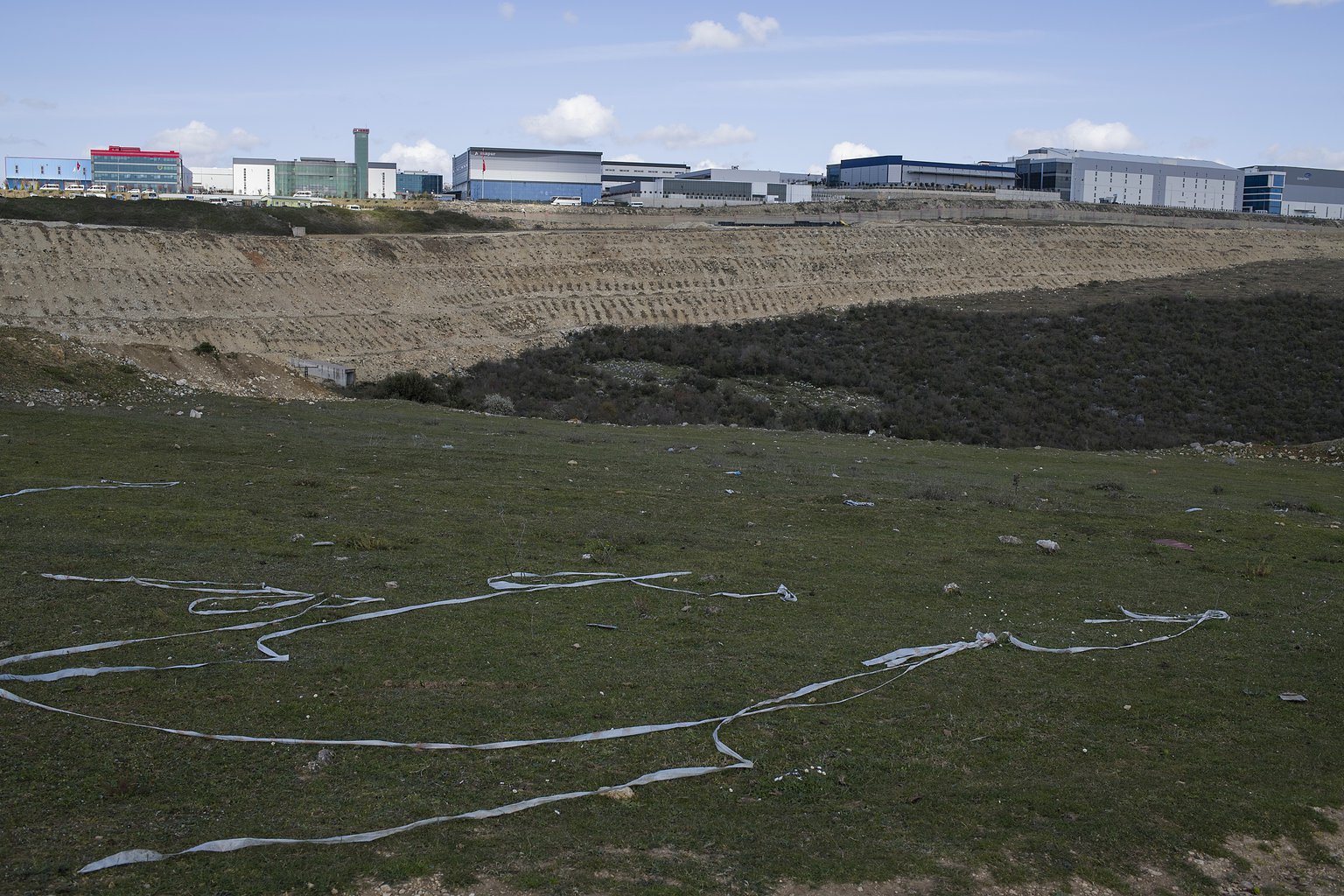Çerkeşli, Turkey – “Everybody stop,” Ismail Sami said, as he pushed his way to the front of the crowd. “Those who love their village should not enter that room.”
The villagers, now waiting, looked at one another, unsure what to do next. A well-dressed man in a sleek business suit, a representative from the company that called the meeting, walked up to Ismail Sami and asked who he was.
“You will know soon enough,” Ismail Sami said, and turned back to the crowd.
On a bright and sunny morning on 30th May this year, around forty people had gathered at a hunters’ café in the centre of Çerkeşli, a small village in Turkey’s Kocaeli province, about an hour’s drive southeast of Istanbul. With a population of just 1,100 people, the village is too small to have its own administrative building. When important public matters arise, officials and villagers meet at the hunters’ café.
Among those outside the café that Thursday in May were a handful of villagers, their village head, and some local councillors from Turkey's governing party. The rest, including Ismail Sami, were from Dilovası, a 47,000-person town located four kilometres to the west.
Inside, nine people - seven men and two women - sat at tables laid out to face an expected crowd, and waited. Four of them were from the Kocaeli governor's office. There were two people from an environmental impact assessment firm, one from Turkey’s environmental ministry, and another from the Directorate of Nature Protection. There was the chief of the Dilovası Forest Management department. A tenth man, Batuhan Ulaş, confronted by Ismail Sami outside, was the representative of Akçansa, joint-owned by the second largest cement producer in the world, Germany's HeidelbergCement, and Sabancı, one of the largest conglomerates in Turkey.
On the agenda was Akçansa's proposal to construct a new cement plant that would begin right at Çerkeşli's doorstep and take over a large swathe of forest and grassland, trapping the residents between a sprawling industrial estate that covers the north and west sides, and the coal processing sites to the south. The area measures 838,000 square metres; and all of it would be carved up and turned into concrete for Turkey’s domestic and international markets.
Public meetings are a legal requirement under Turkey’s environmental laws and provide locals with a chance to object to changes to their homes. But they are often little more than a formality in Turkey. Akçansa’s own environmental impact assessment argues that the damage to Çerkeşli and the surroundings will be minimal and reversible, ignoring the fact that cement production is among the worst-polluting industries in the world.
Now holding the attention of the crowd, 35-year-old Ismail Sami, dressed in a bright yellow t-shirt and brown vest, and with a round belly, made his case. “This plant will cause huge problems for this village and this area,” he said. “This meeting cannot happen. If it does, they will write a note saying it did, and everything is over, the plant will go ahead.”
“You must not attend the meeting,” he said again, and demanded that those inside provide meeting minutes stating that the meeting did not take place.
The Akçansa rep agreed. After a few minutes, the crowd was presented with a handwritten note that said that the locals had opposed the construction. Sami didn’t buy their trick and ripped up the piece of paper, telling them to write a new one. Tensions rose. This time the crowd followed Ulaş and Ismail Sami inside the cafe.
The seven men and two women reluctantly signed the new document, in front of the locals, and conceded that meeting had not occurred and the locals had declined to exercise their right to be informed. Akçansa’s plans to carve up nearly one million square metres of land beside Çerkeşli would have to wait. Sami knew that this was a reprieve, not victory.
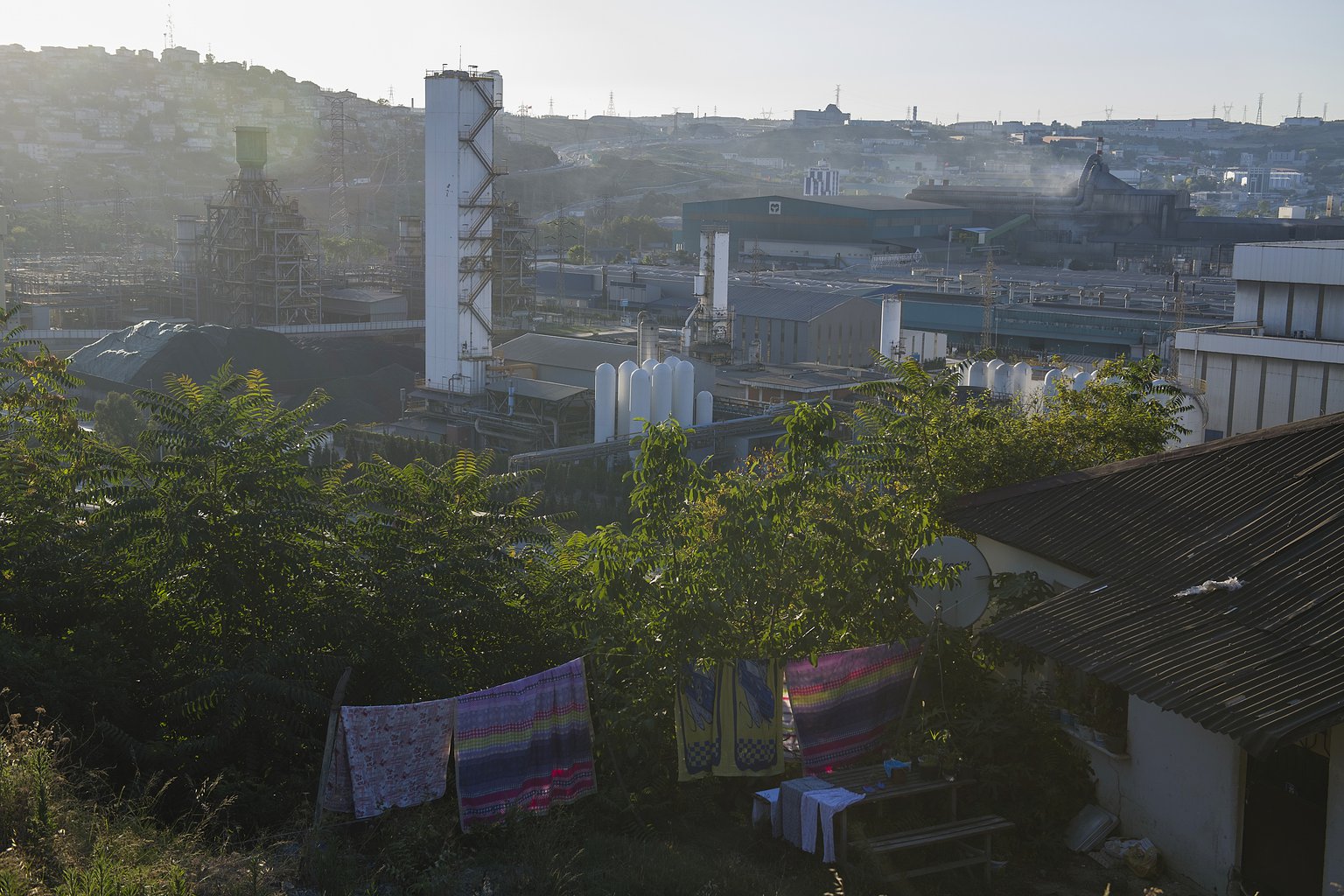
A view of Dilovası from the northern end (Petruț Călinescu, theblacksea.eu)
A health disaster zone
The bid to halt Akçansa’s plans is the latest in a long series of disputes between residents and industrialists across the Kocaeli province. For the past three decades, the region has seen relentless industrial development that has turned it into one of the most polluted areas of Turkey, causing serious environmental and health problems.
Since the beginning of 2019, The Black Sea and the European Investigative Collaborations network investigated the environmental consequences of Kocaeli’s industrialisation, and learned of a pattern of chemical dumping and polluting that has led to a widespread health crisis in the region.
With key health data withheld by the Turkish government, we spoke instead with dozens of locals; adults and children with serious, chronic health problems, and with doctors and other professionals who are too scared to speak about an ongoing public health disaster. Independent studies have shown that even mother’s breast-milk and newborn babies are affected by unhealthy levels of contaminants.
The Toxic Valley investigation also sought to measure the extent of pollution in the area. When official statistics proved vague or out of date, we took samples of Dilovası’s main river and had them analysed by experts. The samples revealed levels of metals and harmful chemicals such as mercury, iron and ammonia far in excess of legal limits.
In 2007, a Turkish parliamentary commission reported on the environmental effects of industrialisation in the area, recommending that Dilovası be designated a “health disaster zone”. But rather than curbing the industrialisation of Kocaeli, the Turkish government has encouraged it, by dramatically expanding the number of industrial zones and providing incentives to businesses in the area.
The Turkish state has, over the past decade since the commission report, provided generous tax incentives worth billions to businesses operating in the region, including to foreign-owned companies, whose role has remained largely unscrutinised. Our research shows that around 15% of the 2000 companies in Kocaeli have foreign capital. Most are from the EU – and Germany, specifically.
Many companies also received support from international, public-owned financial institutions. The European Bank for Reconstruction and Development, owned by EU member states, and the World Bank’s International Finance Corporation, have pumped hundreds of millions into companies in the Kocaeli region.
The locals say that industry operates with impunity, never answering for the systemic disregard for human rights and environmental regulations, but still benefiting from the goodwill of the Turkish state. The fight to halt the latest plans for a super-sized cement factory hits at the core conflict between the rights of the citizens to protect themselves against life-threatening pollution, and the power of the state and corporations to ignore them.
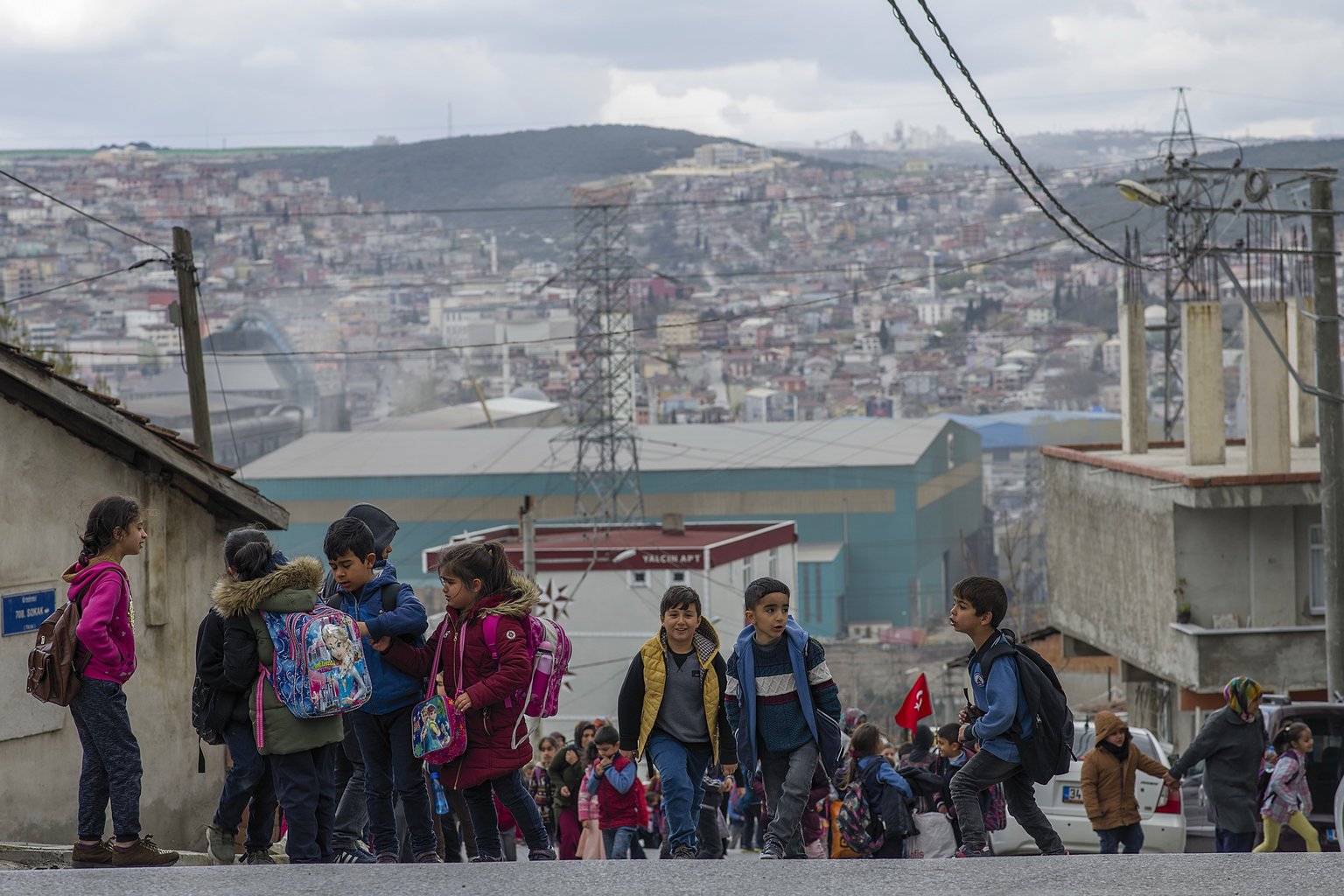
Dilovası’s schoolchildren live, learn and play in the shadows of the industry. Teachers tell us that many of them are sick with breathing problems (Petruț Călinescu, theblacksea.eu )
An Illegal Town
This July, a little over a month after the Akçansa meeting, Ismail Sami sat in the office of his hometown’s only dedicated newspaper, the Dilovası Haber (Dilovası News). Dilovası's only local journalist, Ali Tahir Kaya, produces the paper himself when he can afford the printing costs. Most of his days are spent documenting the abuses of the industry.
Ali Tahir and Ismail Sami are friends and collaborators, exchanging tips and advice over tea, çiğ köfte, and watermelon. They could not look more different. Tahir is a tall, slim man in his early 40s, with long hair, who dresses casually to bound around Dilovası’s hills and jump across the streams with near-limitless energy. The younger Sami, also born in Dilovası, is a local worker who also runs an environmental NGO. He has a neat beard and smart clothes, often dressed in a black turtleneck and a white blazer and polished shoes.
Started in 2007, Sami’s NGO, Ekos-Der, has no staff or budget; it is a banner under which a loose collection of concerned residents can organise and try to save the town where they grew up.
Sami explains to us why he ambushed the meeting in Çerkeşli a month earlier. Ideally, he would like to kill Akçansa's development completely. He, like many others in the town, including Ali Tahir, has breathing problems, and has been diagnosed with chronic obstructive pulmonary disease (COPD), a respiratory illness common in smokers. He’s never smoked.
“We are like a third world country,” he said of Turkey’s capitulation to business. “Everybody comes here to produce. Industry and people are face to face and fighting.”
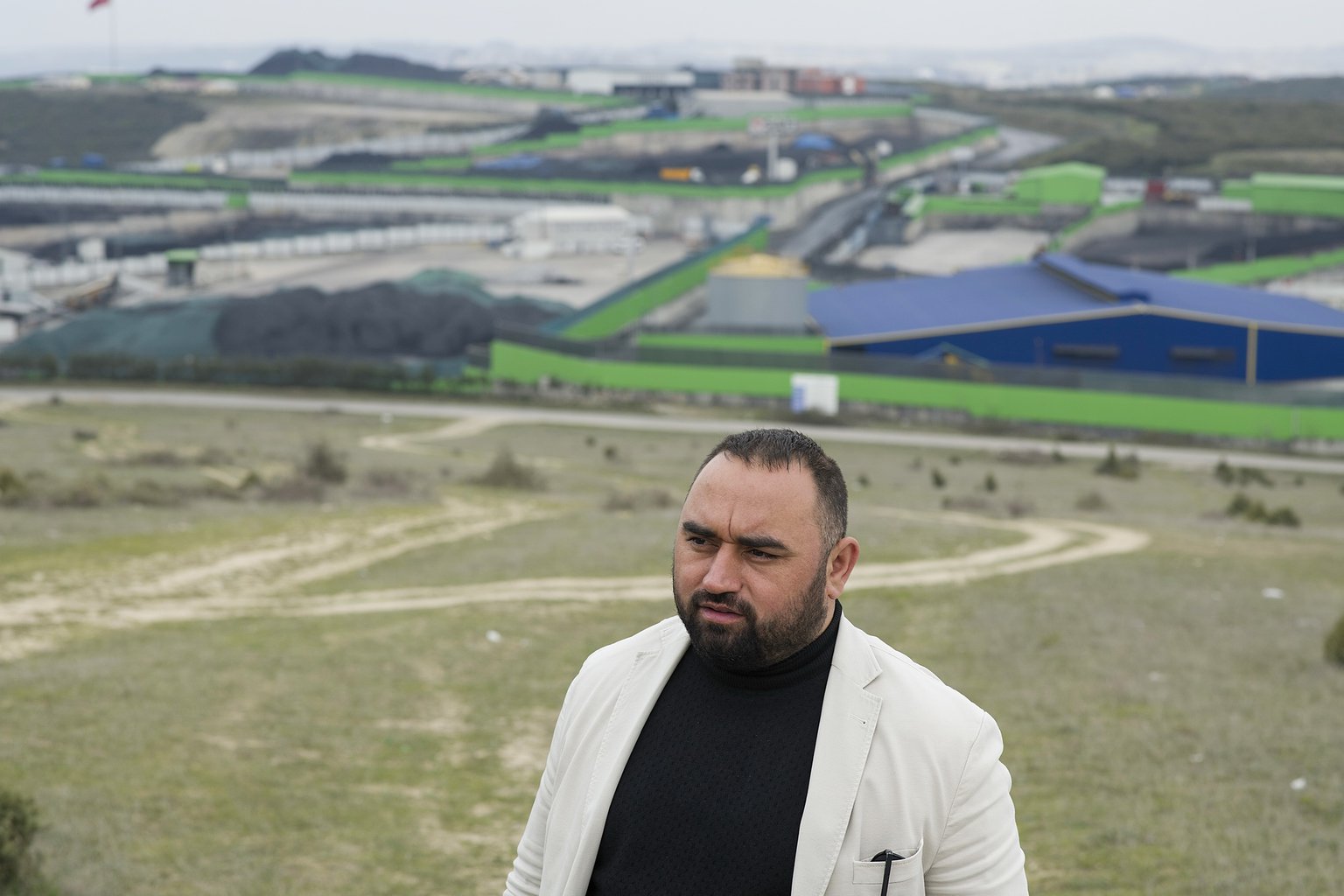
Ismail Sami in front of the coal processing centre dominating one of the hills of Dilovası (Petruț Călinescu / The Black Sea)
Dilovası Haber's humble office is on the first floor of a residential building on the town’s main street, and has large floor-to-ceiling windows that overlook the valley. From here, the dominance of the industry is self evident. The floor of the valley is devoted entirely to manufacturing, with dozens of massive factories sitting beneath the residents who are pushed up on to the hillside on either side. The chimney stacks below pump out thick, black smoke day and night.
It was not always this way. Only a few decades earlier, the area was lush, green hills, with an abundance of wildlife, grape vines and cherry and peach trees dotted along the landscape. A clean river, full of fish, ran through the valley floor, beneath an ancient Ottoman bridge, and into the Gulf of Izmit.
It was home to a few farmers, shepherds, and those with jobs at the few factories that sprung up in the area in the late 1960s and 1970s, including the U.S.'s Chrysler, and Germany’s BASF and the now-closed AEG.
So unremarkable was Dilovası back then that it didn't even have a name. Before 1987, it was considered a part of Gebze, then a small town to the west. In 2006, Dilovası became an independent district. But the way Dilovası was born as a town was a harbinger of the lawlessness that was to come. Locals lied to make it happen.
Ismail Kaya is 66 years old and a retired worker for the Kocaeli municipality. He was the town head of the opposition CHP between 2011-14, and for a while ran the Dilovası Environment and Natural Life Protection Association, a local NGO. He was with Ismail Sami in Çerkeşli during the Akçansa meeting.
Larger than life and quick to tell a story, Kaya, a big man with broad shoulders and a loud voice, considers himself a leftist dissident. He moved to Dilovası from Istanbul in 1983, after he was tortured by the military during the aftermath of Turkey’s 1980 coup d’etat and warned not to return to the city.
After a few years, he and other local workers had the idea to develop the area. To make it happen, they need to become a municipality. But when they sent their first application to the Kocaeli bureau, it was rejected, Kaya told The Black Sea in March.
“[We] didn’t have enough people or houses to become a municipality,” he said. “After the first application was rejected… we [tried again and] put some ‘ghost houses’ on the map to merge two towns that were too far away from each other.”
The establishment of Dilovası was against the rules, he said. But the plan worked. Presented with the “ghost houses”, the government changed the status of the area, granting the locals power to elect officials, request infrastructure development, and issue licenses to business. Kaya and his colleagues had got what they wanted. They didn't anticipate what happened next.
“This was 1987,” he said. “We thought we would develop it, but everybody wanted a piece of the pie. The industrialists came, the administrators of the municipality came, and they all abused the town.”
The Kocaeli land grab had begun, and it has never ceased. Dilovası became the ‘Dilovası Organized Industrial Zone’ and stretched from one side of the valley to the other. It was illegal and a health hazard, the Turkish parliament declared later. It didn't matter. Another zone appeared in Gebze, a large district just over the hill. Then another one in Dilovası. Then another, and another.
At the time of the initial developments, Turkey’s government was embarking on an economic liberalisation project to attract foreign capital, increase productivity, and its export trade, all under the watchful eye of the IMF
The population exploded. Before the 1980s, Gebze, Dilovası's largest neighbour, was home to only 100,000 people; this grew to half a million by 2007, after which the municipality began dividing the area into smaller towns. Dilovası, which was not even included in the census until the end of the decade, has grown from almost nothing to over 47,000.
The Kocaeli province, which wraps around the coast of the Gulf of Izmit, is now home to 2000 manufacturing companies, with more than half of them in Gebze and Dilovası. An analysis by The Black Sea reveals that 12-15 percent of all Kocaeli firms have some foreign ownership, mostly from the EU. German companies lead the pack, making up around a quarter of the foreign owners, ahead of companies from the Netherlands, France and U.K.
Among the international companies are some big names: Bayer, Thysenkrupp, BASF, Marshall Paint, Siemens, Henkel, Pirelli, LG, Ford, Total Oil, Procter & Gamble, and, until recently, Unilever, all have production sites in the small region.
The number is growing. There are now 13 industrial zones, many still under construction, replete with tax incentives, 38 ports, two of them large, and mining and cement plants. The Kocaeli municipal website boasts that it is the “city of industry and investment,” that “accounts for 13% of Turkey’s industrial production.”
The Turkish government under Erdoğan's right wing populist and pro-business Justice and Development Party – known as AKP – has courted new investments by lowering corporate tax, easing foreign investment restrictions, and making it simpler to open companies. When he first became prime minister, in 2003, Erdoğan told foreign-business leaders in Turkey: “If you are encountering roadblocks in terms of bureaucracy, politics, or government; please come directly to me. It is my national duty to eliminate these roadblocks.”
Turkish urban sociologist, Aslı Odman, told The Black Sea, “Three things attract the foreign capital here: cheap labour, loose environmental regulations, and proximity to the markets.”
Onur Hamzaoğlu, a prominent Turkish scientist, said that Dilovası was designed specifically for the international capital to come in after the 1980s: “Cement production, steel production… These dirty industries came in,” he said. “We became the EU’s basement.”
“You live in a sewer”
The townsfolk of Dilovası all talk about the air and how they feel they cannot breathe. Even the shepherds in the hills complain of the pollution. Turks say of Dilovası that it is a place where you roll up your windows as you drive through. The air is thick and sickly and we felt a burning in our throats and lungs after even a short time there.
Entering Dilovası from the highway is like entering some post-apocalyptic movie set. The road through the valley floor is flanked on each side with massive scrap metal foundries, paint factories from the Netherlands, several chemical companies, some from Germany and the U.S. The scene is scored by the relentless din of machinery and the huge lorries that carry materials in and out of town.
The state’s need to attract foreign investment in the 1980s led it to a kind of wild brand of capitalism with little oversight. And the Kocaeli region, and specifically the town of Dilovası, with its proximity to Istanbul and the sea routes to Europe, became the ideal hub for this burgeoning manufacturing industry.
It was not long before health problems appeared. As far back as 1988, one MP raised the alarm about Kocaeli. He named 15 companies that he said contributed seriously to environmental pollution, among them, Henkel, Bayer, BASF, Izocam, Chrysler, and AEG. The MP cited the poisonous smog falling on Dilovası, and a chemical leak from Polisan's paint factory there, that mixed with the drinking water and caused the deaths of several children.
Today, most of the factories are still there. Polisan’s plant is in Dilovası, next to the river, and half owned by Japan's Kansai Paint. And Dilovası's children still suffer.
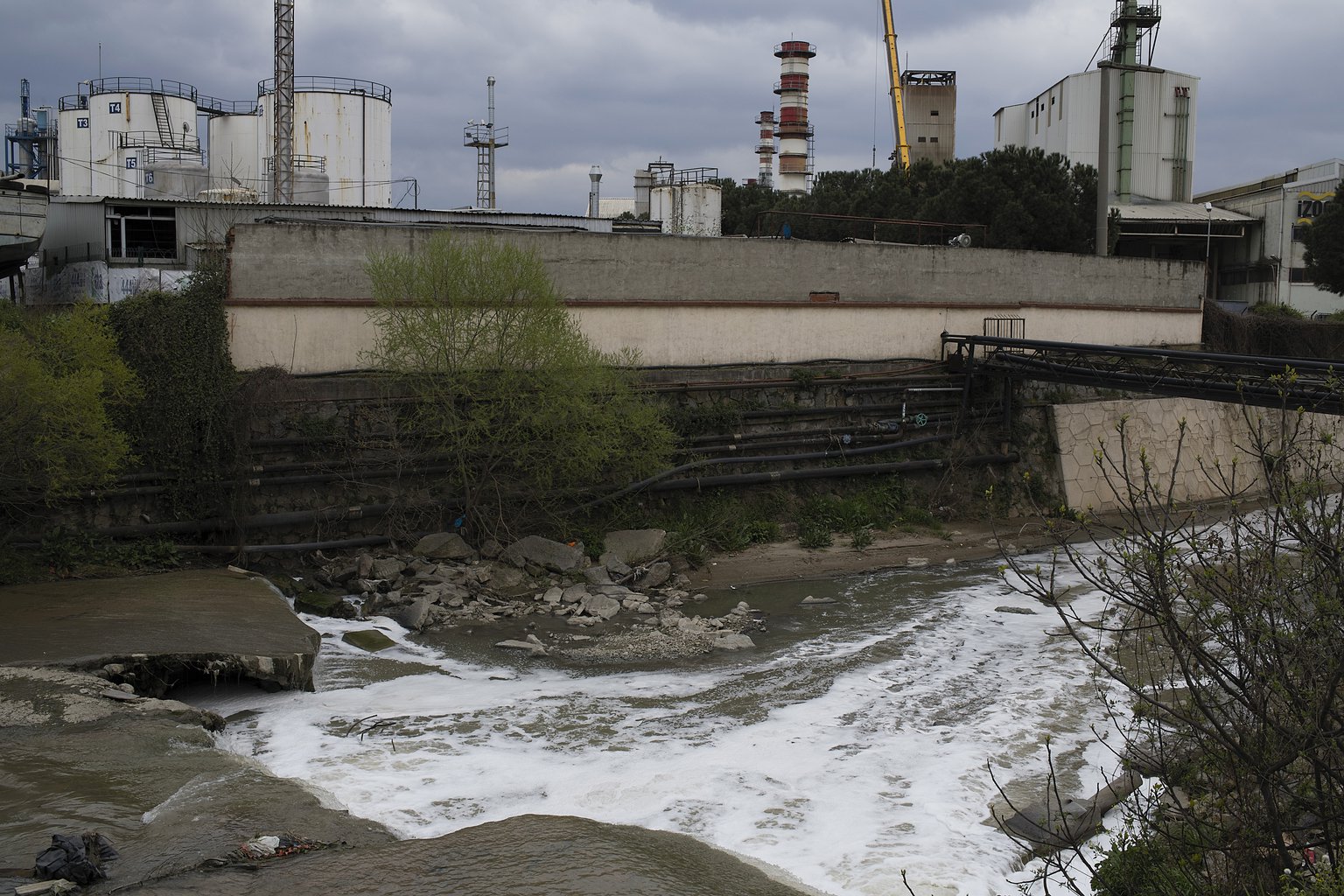
The town's Dilderesi river, which we found to be polluted to very high levels with mercury, iron, ammonia and other toxic substances (Petruț Călinescu / The Black Sea)
There is no data available to the public that shows how many people were admitted to the local hospital for respiratory problems and cancers, and national stats are aggregated. The Black Sea’s Freedom of Information request bounced from one department to another, until health authorities eventually demanded why the information was sought and then stopped answering.
One local health administrator, who asked to stay anonymous, told us that even they cannot access any cumulative data on the health of Dilovası's residents: “I asked countless times to the ministry,” she said. “I can never get anywhere.”
But finding sick people in Dilovası is not difficult. The Black Sea talked with dozens of long-term residents who experience health problems that can be tied in some way to the town’s industrialisation. We met adults and young people, mothers whose kids are too sick to play outside or go to school uninterrupted.
Hayriye Ödemiş, a 35-year-old housewife and a mother of two daughters, Hilal and Havvanur, is so sick that she must sit to have a conversation. We met her on the street outside her ground floor apartment. She asked that we come inside, as she cannot spend too long outdoors. Her acute asthma prevented her from standing and talking at the same time.
Inside her tidy, clean house, where she lives with her husband and children, Hayriye brought us a tray of tea and watermelon and told us how she struggles. She takes much lighter doses of her medication than she needs, she said, in order to protect Hilal, the 18-month-old daughter she breastfeeds. Last year, both her children were diagnosed with asthma.
“Even our doctor was very concerned about the amount of medication my kids need to take,” Hayriye said, as her children played around her. “They’re just little kids. But they need to take them just to be able to go outside.” Havvanur, who is 7 years old, is the sickest. When she tried to speak she became breathless and could barely tell us her name or how old she is.
Hayriye’s doctor in Kocaeli’s capital, Izmit, could not immediately understand why a young housewife, a non-smoker, would have such bad lungs. He told her that her lungs looked like she did “heavy duty work in a bad environment” or that she “smoked a pack a day”.
“He kept asking me questions: Is there dust where you live? Do you work at a bakery?” said Hayriye. “On and on. Then he finally asked where I lived. When I told him Dilovası, he said ‘Now I get it.’”
It’s painful for Hayriye to see the town so accepting of their health problems. “We are stronger than we think; we should raise our voices,” she said. “The foreign companies came here because we were silent. Imagine if we went to their countries and set up our factories there, polluting. They would never allow it. They are torturing us. This is cruelty.”
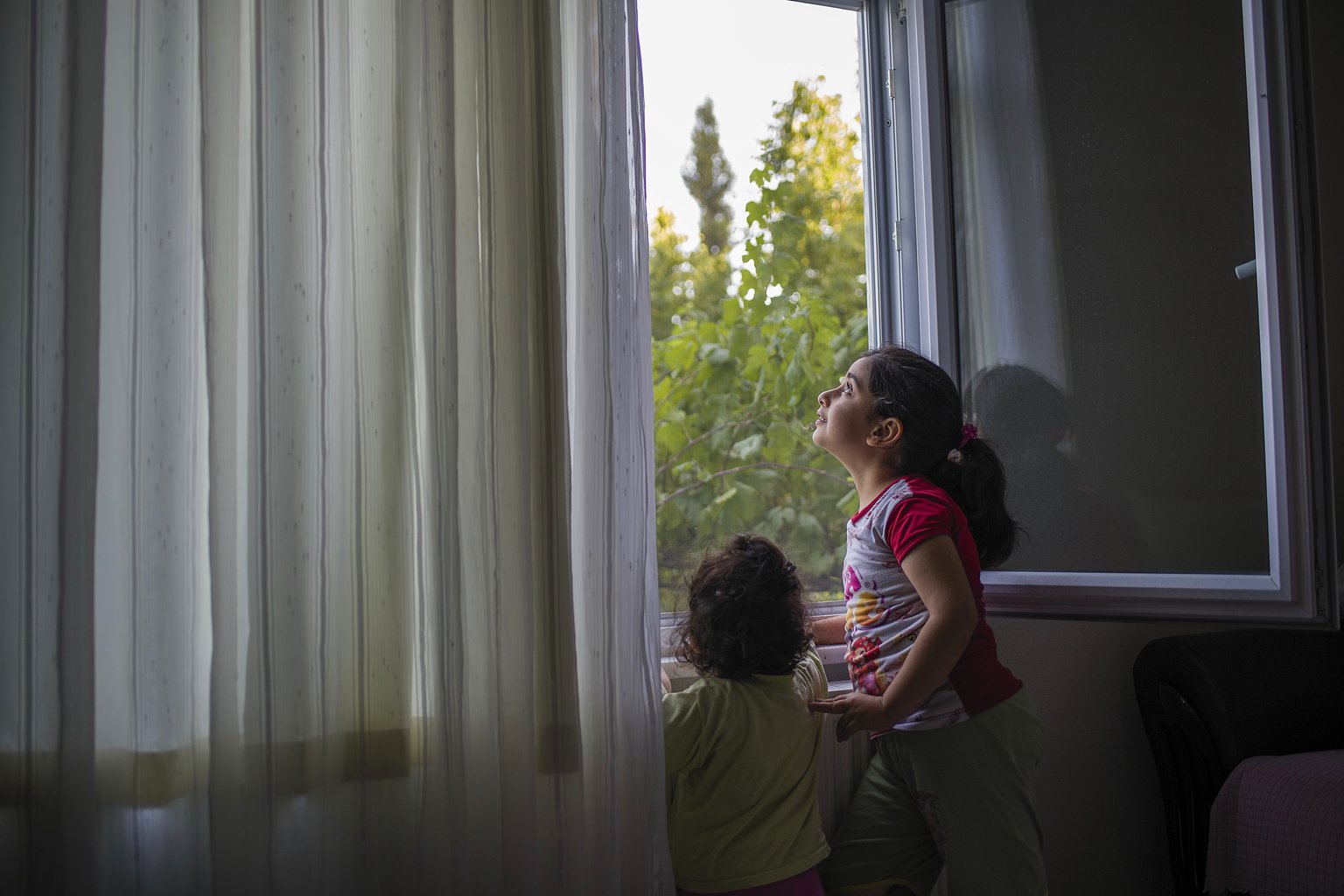
Hayriye Ödemiş's children, Hilal (18 months) and Havvanur (7). Both children are sick. Havvanur can barely speak her name. (Petruț Călinescu / The Black Sea)
The impact is not only felt by those close to the factories. Living on the hill above Dilovası, the family of 55-year-old shepherd Yaşar Aydın are all sick. In July, Yaşar, his wife Kudret, and two of his daughters, sat on a divan in the one-storey house they built twenty years ago and told us about the physical problems they and their animals deal with on a daily basis.
Kudret, a woman with deep lines in her face, who only speaks Kurdish, was diagnosed with acute asthma four years ago, at the age of 66. Now 70 years old, she cannot leave the house; going outside worsens her condition. Their 21-year-old daughter, Zozan, was diagnosed with the same problem when she was 18, an unusual age to develop asthma.
“One day, I just couldn’t breathe. It was like my lungs were blocked,” she said. “I would leave Dilovası and feel fine. Then I would come home and feel worse again. Me and my mother share the breathing nebuliser, but mom’s medicines are heavier.” Zozan’s 5-year-old niece, Devran, who lives next door with his parents, also has asthma.
Yaşar's daughter Mensure, 27, has spots on her skin and irregular bleeding of her throat, she said, symptoms the doctors cannot yet explain. Her medical report shows a barrage of tests, including cancer biopsies.
Even their livestock suffer, they say. “Our sheep also got this thing where they couldn’t breath a while ago,” Mensure said. “It was as if they had the flu, their noses were all blocked. They would open their mouth and would have wheezing sounds. We took them to the vet and he said it might be because of bad air.”
Ismail Kaya, the former Dilovası municipal worker, a non-smoker, developed COPD after he moved to the town. He told us that while in Azerbaijan a few years ago, he visited a doctor to request help with a chronic sinus problem that aggravated his COPD.
“He asked why would I get this problem so regularly as it’s not something that people get,” he said. “Then he asked me where I lived, and I said Kocaeli. He looked at me, disgusted, and said, ‘You live in a sewer.’
“A doctor from Azerbaijan said this. It’s sad.”
"I cannot talk about this"
Those who work in town and interact with the sick on a daily basis – the doctors, teachers and pharmacists – are all too afraid to talk to journalists. Back in March, when The Black Sea reporters approached two general practitioners at a local state clinic, their fear was palpable.
One doctor, upon hearing our questions, left immediately, saying, “I cannot talk about this.” The other doctor pretended to leave the room with his colleague, and then instead closed the door behind him. Agitated and visibly shaking, he paced back and forth in his office and spoke in a low voice.
“The air is bad,” he said. “I can see it myself commuting from another town to work. Children get sick, yes, but I treat everybody: the elderly, adults, kids, they all get sick. The majority of my patients come here due to respiratory diseases. I give them medicine, but the illnesses continue because of the environment.
“Of course, I feel responsible as a doctor,” he continued. “I cannot do anything but give them medication until they die. They are putting those who speak up under pressure. They want us not to speak. If I gave my name for this story, I couldn’t come to work tomorrow.”
Another doctor, at a different clinic, told us she would like to speak with us about the health issues in the town, but could not without official permission from the state.
A pharmacist, who wished to remain anonymous, said to us that the majority of prescriptions they fill are for dealing with asthma and COPD. “We always have medication for these [conditions] because we know many people will come during each day. We always have big stocks of respiratory medication.”
One primary-school deputy headteacher told us that kids who miss class do so because of breathing problems. “I process the absence papers,” he said. “When a kid is absent, the doctor’s notice almost always mentions either asthma or bronchitis.”
He told us that a few years ago, scientists came to measure the pollution around Dilovası's schools. “They came here some years ago from a university to get some air measurements. They set up some equipment. After, they told us the air around the school contains iron. I don’t know what this means or what happened afterwards.”
Another teacher from Dilovası said that he is conflicted when he sees worsening breathing problems in his schoolchildren. “All these kids who come here are like my own children, so I feel responsible and sometimes tell the parents they should maybe move,” he said. “But how can I insist? The parents all have houses and jobs here. Where can they go? My own kids also have respiratory problems.”
“I am just trying everything I can, I try to plant trees in the school garden, I want them to run around on the grass, just be kids,” he said. “Beyond that, it’s politics and it’s beyond me. These are things I have the power to do.”
Many of the state schools in Dilovası are financed and named after the companies operating there. Paint companies Polisan and Marshall Boya, the Solventaş chemical company, Yılport, Dilovası's main terminal and port, and the huge metal smelters Çolakoğlu and Diler, all have schools named after them.
“Aren’t they scared of God?”
It is easy to understand why so many residents experience serious breathing issues. For 24 hours a day, the chimney stacks from the factories in the valley spew out smoke. Because the residents live on the hillsides, above the valley floor, the fumes are expelled into the air they breathe, rather than into the air above them.
One of the worst offenders for more than three decades is Izocam, Turkey’s leading insulation manufacturer, and among the first companies to open in Dilovası. The company, jointly owned by a French firm, Saint-Gobain, and the Kuwaiti Alghanim Industries, often belches thick smoke from its distinctive chimney. Sometimes this is caught on camera, most recently as a month ago.
Izocam uses many known toxins and carcinogens in its mineral wool production, according to its website. We requested comment from Saint-Gobain about the evidence collected by The Black Sea. They told us that the event was an "exceptional incident" caused by a "lack of combustion of gas (lack of air intake) when lighting the oven used on the production site." It did not address the other videos.
Almost every factory in the valley emits smog into the residents' air day and night. The locals complain about the two Turkish metal smelters, Diler and Çolakoğlu, which have been in Dilovası for as long as Izocam.
The Black Sea learned that Europe sends most of its scrap metal to Turkey, via ports in the Netherlands, Belgium, and alike. Çolakoğlu, the most prominent of Turkey's scrap companies, melts it down and sells it back to Europe for use in the construction of highways and buildings. It is notoriously dirty work, which requires extremely high temperatures, generated from coal burning.
Çolakoğlu provided ‘recycled’ steel for the Sluishuis, in Amsterdam, an “ultra-sustainable” luxury apartment complex that boasts of “zero‐energy residences” and “renewable resources throughout the building.”
Sluishuis told EIC that the steel purchase was "handled by the subcontractor," but that it will consider including additional sustainability restrictions "for new or future projects that we develop."
The vast coal processing plants that overlook the valley to the east, barely 500 meters from the edge of the town, are a source of regular complaints. Half a dozen companies process and store coal, most of it for their factories of Dilovası, but also for the wider region. The companies import and wash coal from the likes of Colombia, South Africa and Russia, and let the dirty waste water run down a small stream to the south.
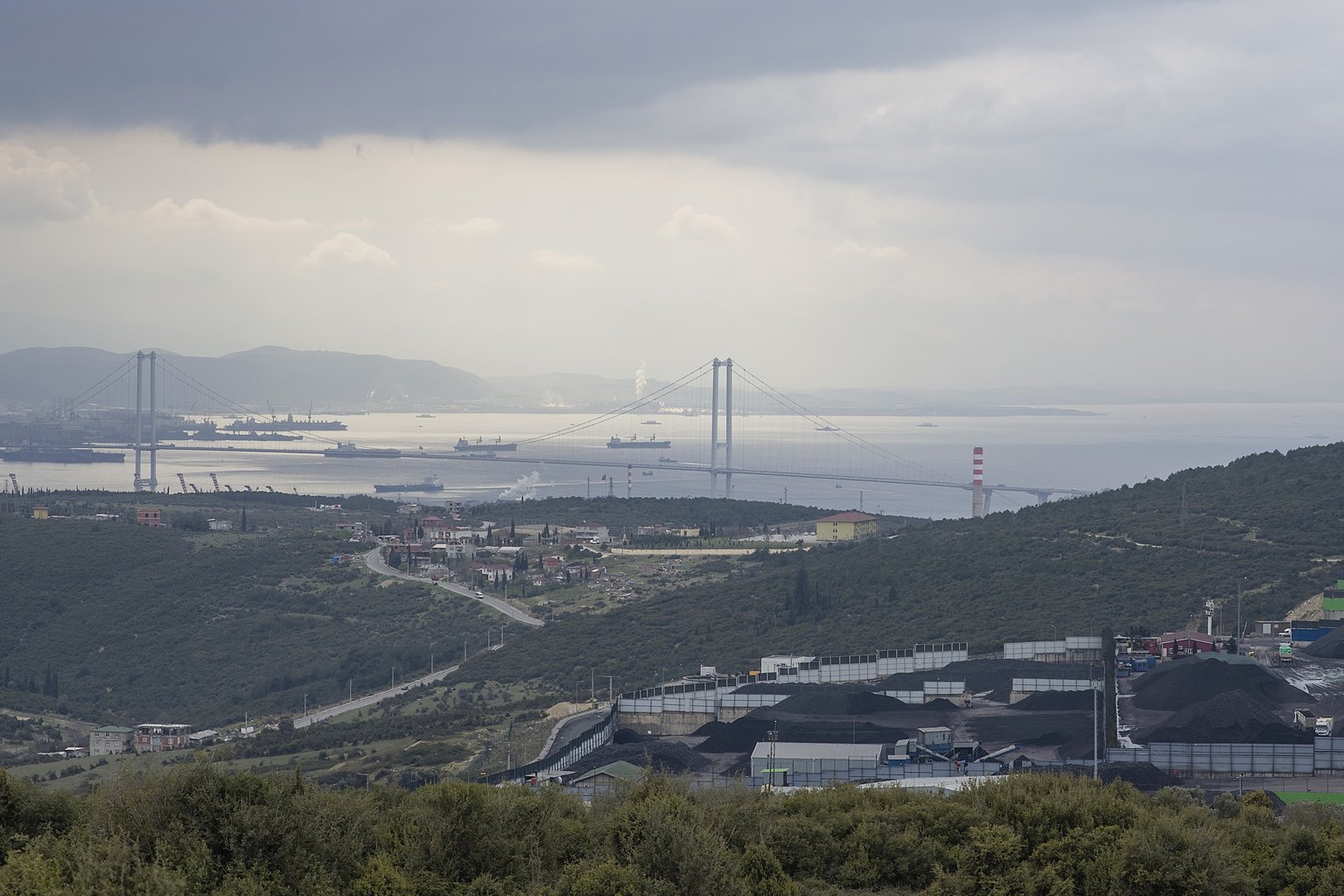
A view of the Gulf of Izmit and the coal site from the hills above Dilovası (Petruț Călinescu / The Black Sea)
The coal is used to supply the factories with fuel. The locals say that the wind blows the black dust into the town and makes them sick, coating their walls and windows, and agitating their lungs. The municipality said they ordered the company to cover the coal, but images taken by The Black Sea show the company flouts this requirement. They instead built walls to obscure the view.
“[The municipality] told us before the elections [in March] that they’d solve everything. But it’s all lies,” said Sereyya Tur, a 38-year-old housewife. Sereyya, who lives with her family in a small, one-storey house located only 700 meters from the coal sites, also has thyroid cancer, despite having no family history of the disease. The dust covers her windows daily. She points to the hill where the centre sits. “The industry and the coal place ruined our lives. They are destroying us,” she said. “It’s not fair. Aren’t they scared of God?”
The Dissident Scientist
Aside from the ubiquitous breathing problems among the townsfolk, academic studies conducted since 2005 have shown that cancer rates in Dilovası are well above the norm. The subject is not an easy one to broach with the locals, however. Most refer to it as simply hastalık – the “disease”.
But we heard of people in treatment more than we saw them. Discussing the “disease” with locals is taboo, especially when referring to the health of their neighbours. The town is protective of cancer sufferers. Those who contracted lung cancer were not willing to share, we found; either out of embarrassment at being seen physically weak, or a reluctance to take part in a story that highlights the town's health problems.
One man, a 27 year old who worked for AKP’s local office declined to speak with us, died of lung cancer only a few weeks after our visit in July. He did not want to risk blaming the state, we were told. The wife of another man with lung cancer, who was undergoing treatment, told us that he did not want to be seen with no hair or talk to strangers.
If there is a man responsible for bringing the plight of Dilovası residents into Turkey’s public consciousness, it is Onur Hamzaoğlu, a medical doctor and public health specialist, who since the mid-2000s has conducted several health studies on the region.
We met with Hamzaoğlu for a two-hour interview in Istanbul in February. Always neatly dressed in a suit, with black-framed eyeglasses and a thick, grey moustache, giving him the appearance of a fatherly professor, the gentle and soft-spoken scientist is for many a symbol for the environmental movement in Dilovası. Calling himself an “orthodox dissident”, the military-trained doctor was appointed to lead the Kocaeli University’s public health department in 2001, where he soon saw first hand the effects of the region’s industrialisation.
In 2005, Hamzaoğlu caused his first scandal in Turkey after he published the results of his study showing that living in Dilovası for ten years increases a person’s risk of dying from cancer by 440 percent. The same study put the cancer-related death rate in Dilovası at 33 percent, at the time 2.5 times higher than Turkey’s average, and 2.6 times higher than the world average.
As news of the study hit the front pages of the country’s newspapers, there was an uproar, and many in Dilovası began protesting the lack of action against the companies. They were soon joined by supporters from Istanbul, young people, unions, socialists, and anarchists.
“The sight of an anarchist group unfolding their flag at a demonstration freaked out the locals,” local journalist Ali Tahir said. The cops, brought in from Kocaeli, readied their shields and tear gas in the tiny town square. “We were told by the police that the violence would start unless the outsiders left the town. The locals told them to leave. So they left and the movement died down. I believe we missed a chance that day.”
Sensing a growing unrest, the Turkish parliament established a bi-partisan commission in 2006 to investigate not only the findings of Hamzaoğlu’s study, but the wider impact of the manufacturing industry on public health and environment, especially in Dilovası.
A year later, the commission released “The Dilovası Report,” a 376-page document that laid out the extent of the environmental and public health crisis, citing uncontrolled industrialisation and the flouting of environmental regulations as the cause.
In their conclusion, the commission members suggested designating the area a “public health disaster zone” and said that there should be no expansion of new companies or industrial zones. It also stated that residents in two Dilovası neighbourhoods should be relocated and the health of the town should be subject to frequent monitoring.
None of the 29 resolutions ever became law.
Even though Hamzaoğlu's cancer research created some awareness in Turkey, the lack of government action bothered him. “There was an outcry,” he told The Black Sea. “But not real solutions. And this made me restless.”
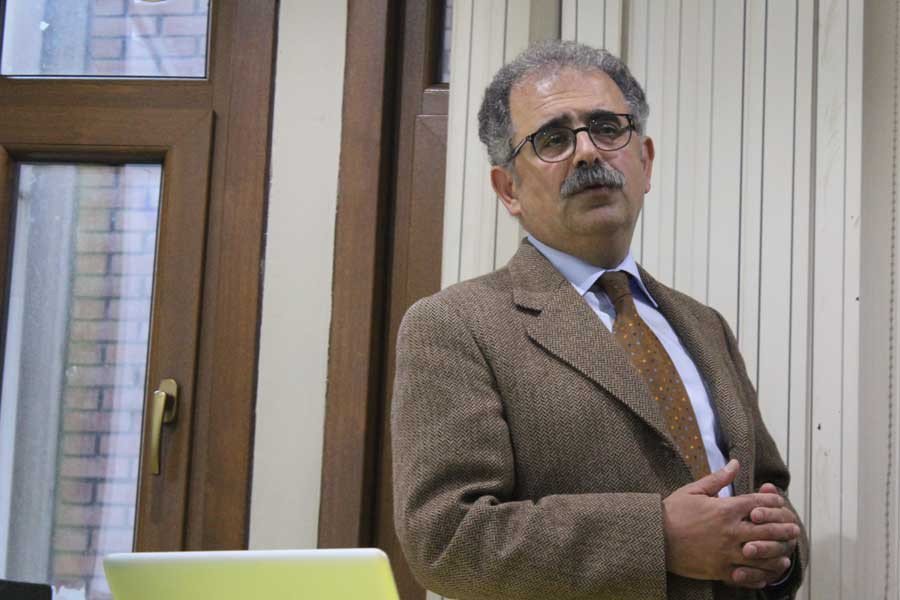
Professor Onur Hamzaoğlu, the man who helped bring the health of Kocaeli residents to the wider public (Photo by Evrensel)
Professor Hamzaoğlu is diligent in his work, but is not your everyday scientist, tied to his lab, performing experiments and writing reports. He makes regular public statements, joins demonstrations, and talks openly with the press. His aim, he said, is to have science produce meaningful solutions to real-life problems.
So he reassessed his approach. “I thought of a project regarding breastmilk and baby poop,” he said. “This was deliberate. I thought I could really get people’s attention if I was studying mothers and their babies in Dilovası.”
Hamzaoğlu knew it was going to be an uphill battle. In 2009, he and his team set about collecting the first drops of breastmilk, called colostrum, from new mothers. They then analysed the children’s meconium; the first, untainted faeces, which contains only substances the mothers took into their bodies during pregnancy.
His research took three years, he said. And during the process he forced state labs to renew their equipment and obtain proper accreditations, so that his results couldn’t be challenged. He reviewed the numbers over and over.
He would find that both the faeces and the breastmilk were riddled with heavy metals, including aluminium, cadmium, mercury and arsenic. “Once a mother has [these toxins inside her body], of course the baby will have it too,” Hamzaoğlu explained. His student, Dr. Melike Yavuz, then conducted further research that followed these babies until they were one year old. She found that there was a higher chance that these children would develop neurological problems.
After the results, published in 2011, showed an abundance of heavy metals in the bodies of new mothers and their babies, the backlash against Hamzaoğlu was severe. While the studies were being discussed in Turkish newspapers and on TV, Hamzaoğlu's university responded by denying that his study had even been completed. Then the Kocaeli mayor publicly denounced him as a “charlatan”. The attacks then became more systematic. The Kocaeli and Dilovası mayors sued Hamzaoğlu in criminal court “for inciting fear and panic in the public.”
After the court declared a lack of jurisdiction in the case, his employer, Kocaeli University, opened a disciplinary investigation. At the same time, the Ministry of Health’s Cancer Department lodged a complaint in the Council of Higher Education, accusing Hamzaoğlu of “misinforming the public and causing panic.”
The Turkish government continues to treat Hamzaoğlu as a troublemaker. In 2016, Hamzaoğlu, along with 1128 other academics, signed the Academics for Peace declaration that urged the Turkish government to halt its destructive military campaign against Kurdish-majority towns in the southeast. He was promptly fired.
But if the state hoped Hamzaoğlu would learn his lesson, it failed to register with the doctor. On 4 February, 2018, Hamzaoğlu made a public statement saying that, “War is a public health issue,” referring to Turkey's military incursion into Syria. Five days later, the police appeared at his door and he was arrested.
During his first hearing five months later, Hamzaoğlu told the judge that, “Being anti-war is the primary requirement to be able to stay human in the 21st century. I want to stay human.” The judge ordered his release. His trial continues.
For many Dilovası locals, however, Hamzaoğlu is a hero, and meeting him is a badge of honour. One resident told us, proudly, “I have his number right here on my phone. I went to all of his trials.” Many in Dilovası believe the trials against Hamzaoğlu stem from his work and vocal defence of the town’s residents. Hamzaoğlu himself has no regrets. “I’m not an idealist,” he said. “I did what I had to do.”
“They punished Dr Hamzaoğlu [for his studies] because they couldn’t produce a counter-narrative to what he said,” Ismail Sami told us. “Because what he says is true. They couldn’t make up anything to discredit him. They could only jail and sack him… they couldn’t say it was a lie.”
The Environment
Hamzaoğlu inspired other scientists to look at the effects of industry on the waters, air and soil in Dilovası and the nearby towns. One study, conducted in 2011, by a faculty member at Karadeniz Technical University, tested the soil in over fifty locations around Dilovası and Gebze.
The results show that the soil was polluted in places with “high concentrations” of cadmium, arsenic, lead, zinc, manganese, copper, chromium and mercury, and the “[s]preading of hazardous wastes from industrial facilities in the study area via rain or wind is the main source of soil pollution.”
The Black Sea mapped the sample sites, the schools and the foreign companies.
Gülten Yaylalı-Abanuz’s soil study provides an insight into the companies' effect on the surrounding area. “I heard about the study on heavy metals in breastmilk,” she told The Black Sea, “so I got interested in the topic. I collected surface soil from 0.5 cm depth. The values were very high. The reason is completely industrial pollution.”
But no one followed up on her work specifically. “One should look at these issues in a wholesome way,” she said. “I am a geologist so I studied the soil. The next person should study the water. Then samples from human skin and hair can be collected… If studies show consistent levels of contamination and an association can be established, then the relevant local authorities need to take action. Preventing diseases is much less costly than treating many people suffering from the consequences of such contamination.”
The Turkish state did conduct a large ecological study into the air and coastal waters in Turkey, published in 2016, but was coy about specific levels of contaminants, and the causes. Independent research conducted on the Gulf of Izmit, as it enters the Marmara Sea, found high concentrations of lead, cadmium, chromium, iron, manganese and zinc, near the shores, which, as one study stated, “are evidence for uncontrolled release of pollutants in the water.”
The Black Sea conducted its own testing on the main river in Dilovası, the Dilderesi, which cuts right through the town, beside many factories. It was once the main source of freshwater for its residents.
Idris Aydik, 55, who co-founded Ekos-Der with Ismail Sami, said that before the town became a wasteland, it had an abundance of life. “The nature here was amazing. The river had big fish, and we would go fishing there,” he said. “My kids learned to swim in that river. We would collect its water to use as drinking water. We would make tea with it, and it’d be delicious. You’d go next to it, and sit and listen to the stream and relax.”
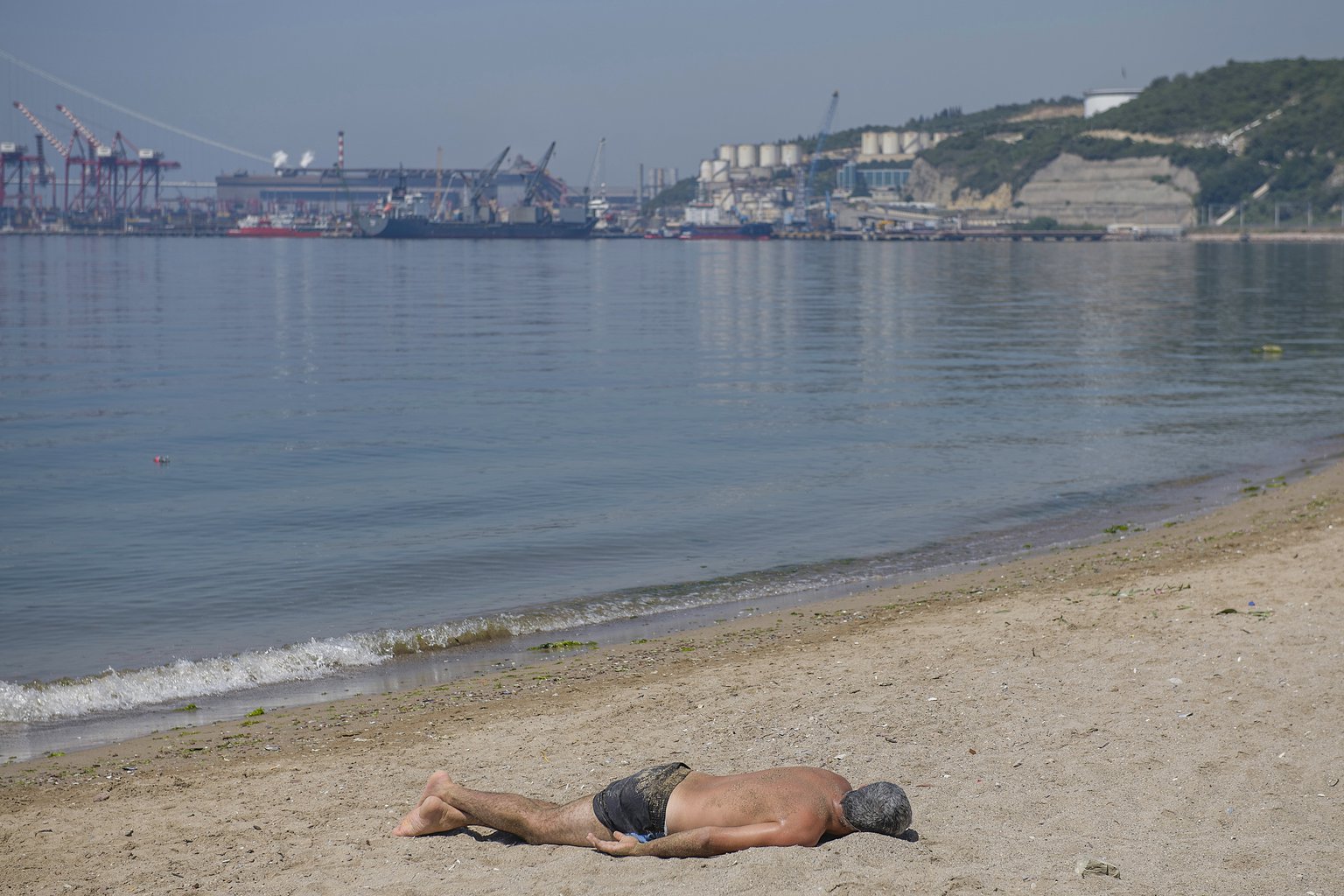
A local man sunbathes on the dirt beach, next to Dilovası's Yilport terminal. The 2007 Parliament report said that 40% of the pollution in this sea comes from the Dilderesi river (Petruț Călinescu / The Black Sea)
Today, the Dilderesi is surrounded on all sides by industry, including Germany’s BASF, the French-Kuwaiti Izocam, Marshall Paint from the Netherlands, American-owned Dow Chemicals, the Diler Demir Çelik scrap metal plant, and others. The river leads into the Gulf of Izmit right next to the Yılport port and terminal. A little way to the east, near where the river meets the sea, locals try to fish, or take their kids to swim on a dirt beach. There are few alternatives for leisure activities.
Residents say that some of the companies regularly discharge waste into the Dilderesi. On several occasions, The Black Sea witnessed thick, foamy discharges, with a strong, sickly smell of chemicals flowing into the river from side tunnels.
“This pollution is normal,” Ismail Sami said, pointing to the river from the Ottoman bridge above it. “But it is often worse at night, when the factories have something even worse to get rid of.”
On an early morning in July, when there was no noticeable discharge and before the factories began their day shifts, we obtained a sample from the Dilderesi. It was collected according to the advice of the Chamber of Environmental Engineers in Kocaeli, and rushed in a cold-box to a fully accredited university lab in Istanbul. There a professor tested the water for heavy metals and other pollutant materials, under the supervision of the head of the faculty.
The results are striking. Despite having no obvious sign of contamination that morning, the river sample contained levels of pollutants many times higher than the thresholds considered acceptable even under Turkish regulations –which are usually higher than the EU’s own.
Mercury was 30 times higher than regulations allow and nitrite and phosphorus were thirty five times higher; Iron was nearly fifteen times above the limit; manganese was four-times higher, and there was twice the amount of nickel. The professor, who asked that his lab not be named in our report for fear of professional reprisals, said the river water was a “Grade 4 level,” the worst possible designation.
“Mercury is a cause for concern,” said Dr. Jos Vink, an expert on water quality in the Netherlands, who assessed the results. “The concentration exceeds the [maximum acceptable concentration] environmental quality standard by a factor of 30 [and] is acutely toxic in this concentration.” Mercury is known for causing brain impairments in children and babies.
“The metals mercury, cobalt, nickel and zinc exceed the water quality standards to a large extent,” Vink added. “The ecological risks are additionally high due to nitrite, ammonium and phosphate. Basically it is not suitable for drinking and/or swimming.”
The water contained many other metals and toxins, but at a level below Turkey's regulations. Interpreting the results, Paul Whitehead, a professor of water sciences at the University of Oxford, in the U.K., told us: “Your data shows very high ammonia, which is highly toxic because it produces low dissolved oxygen levels. There are also high levels of metals, particularly mercury and aluminium, both of which are highly toxic. So this is a danger to people using the water for washing, swimming etc. Needless to say it will have an impact on the coast/sea as well.”
Aluminium and iron have toxic effects on human bodies, and high ammonia and nitrite kills biological life in water.
“Clearly, it’s unregulated factory discharges,” Professor Whitehead added. But even this damage is reversible, he said. “[It] just needs the government to treat domestic waste/effluents and [the] industry to install adequate treatment plants.”
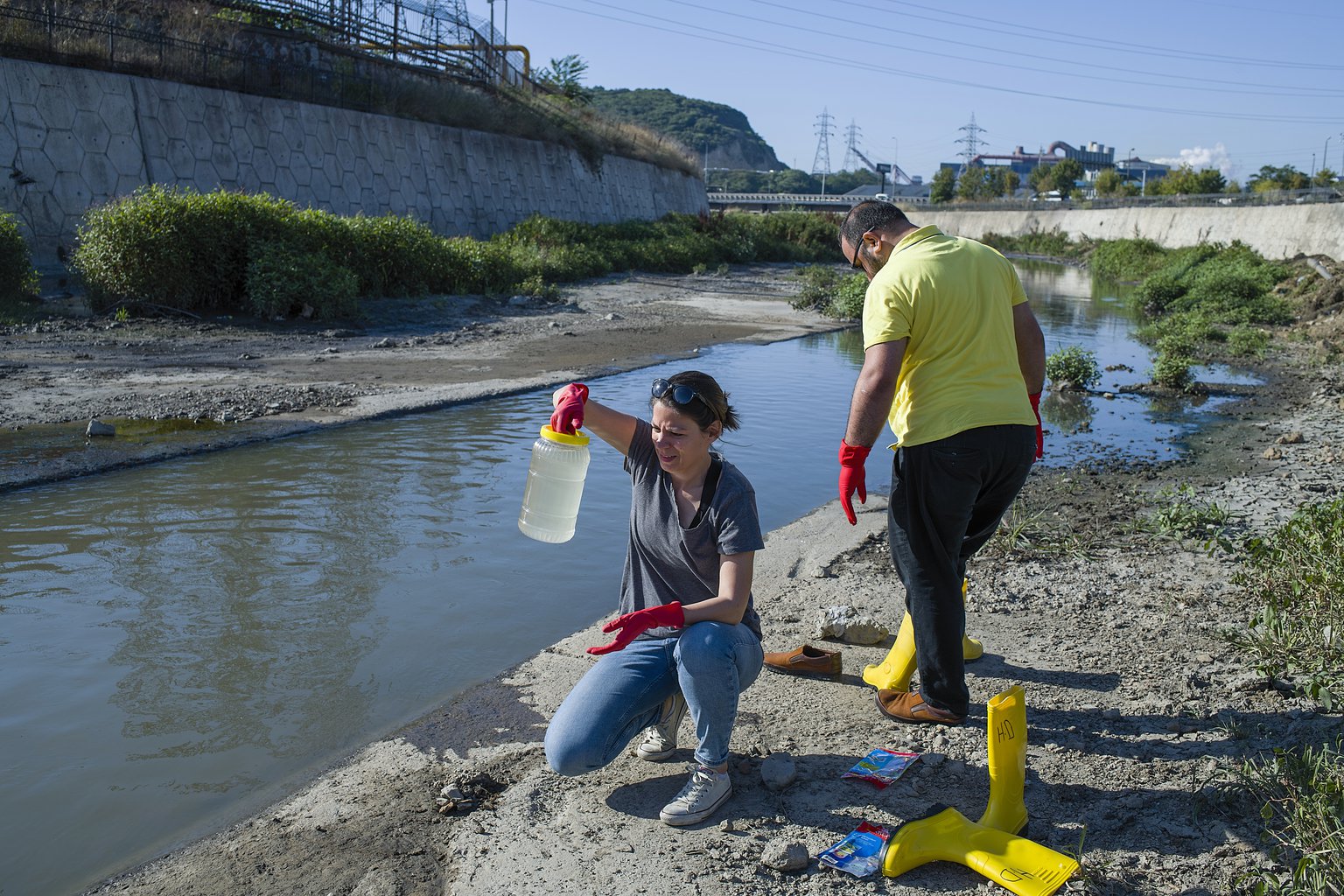
Our journalist, with the help of Ismail Sami, takes water samples from the Dilderesi river (Petruț Călinescu / The Black Sea)
Government incentives, public outrage
The brief deluge of environmental and biological studies in the Kocaeli region over the past decade and a half did little to quell the state's appetite for manufacturing there. In the last five years alone, it has provided generous incentive packages to over 1000 new and existing companies operating in the province, gifting them billions in VAT, social security, corporate, and customs tax breaks.
Foreign companies take advantage of financial goodwill of the Turkish state. Of the 250 companies in the foreign owners list, we found that almost all of them received tax breaks at some point during the past ten years, according to our review of Turkish government data. These include Izocam, the mineral wool firm, which last year received a 90 percent cut in corporation taxes, as well as a zero-percent VAT rate. Bayer, Colgate-Palmolive, Bayer, Ford, and BASF, AkzoNobel and Marshall Boya, and Siemens, all also received various levels of VAT, corporate, customs or employee tax exemptions.
The European Bank for Reconstruction and Development (EBRD) and World Bank have also been kind to companies. We found that Turkey is the biggest investment country of the EBRD, a bank owned by the EU's member states and with a claim to “promote environmentally sound and sustainable development”. In this decade alone, it provided over €480 million in loans to foreign-owned companies operating in Kocaeli. Most were issued in the past three years.
The International Finance Corporation, a World Bank institution, which works to develop economies and “end extreme poverty”, has, since the mid 1990s, given loans of more than $760 million, with nearly half of the projects occurring after Hamzaoğlu's landmark study in 2005.
With little land left to build factories in the towns, the government instead pushes new business up into the hills above Dilovası, to new industrial zones that now fill up with companies from all over the world. Two of the recent zones - IMES and Gebkim – are home to the likes of Cargill, Hans Berg GmbH, KÖSTER Bauchemie. These are only a few hundred metres from the village of Çerkeşli and the proposed HeidelbergCement site.
HeidelbergCement's Akçansa, which already has over 40 production sites in Turkey, also received tax incentives on some of these operations, but would not say whether they had asked for tax breaks on the Çerkeşli investment.
The few locals who have fought back, armed only with a few studies and the Turkish parliamentary commission’s ignored 2007 report, have yet to make a dent on the might of industry in Kocaeli and Dilovası.
There have been attempts to take cases to Turkish courts. Sat in a white plastic chair on top of a small hill, in front of an abandoned hut that he is trying to turn into a local café, Ahmet Cebeci watches his wife, Sevgi, at all times as he talks. The 50-year-old Sevgi’s Lymphoma is back and she can only speak in a low voice and Ahmet jumps to help her each time she speaks.
After doctors diagnosed Sevgi, in 2010, they told Ahmet that she would not survive because her cancer was too aggressive. “They told me to give her whatever she wanted,” he said. “She wanted to fight the industry. She jumped in front of the bulldozers. She is a warrior.”
The Cebecis filed their first lawsuit in 2010. It was against the construction of chemical tanks near their home. In 2010, the court ruled in their favour, declaring the construction illegal on the basis it was encroaching on protected forest land. The AKP-appointed governor of Kocaeli, Ercan Topaca, refused to obey the court’s order, and the tanks were built.
Two years later, they tried to sue the Ministry of Health claiming that the polluted air by the industry caused her cancer, and asked for one lira in damages. “It was symbolic,” she said. “I just wanted them to admit they are killing us.”
The court rejected the case and cited doctors' testimony that her cancer could not be directly attributed to the poor-quality air. But they admitted that they could also not discount it. Although Sevgi recovered from her cancer, it recently returned. Today, she and her neighbours live side by side to hundreds of giant, white metal tanks filled with a variety of chemicals. Every now and then, a strange smell fills the small neighbourhood.
The tanks were built by a company owned by Dilovası’s new mayor, Hamza Şayir, a short and slightly stocky man with grey hair, who was elected from AKP in March. Şayir's company, Şayir Engineering, builds pipes, roads, small bridges, and storage tanks. Since the election, he says is no longer in charge of his company, but records show that he is still a fifty percent owner, and almost all of his clients operate in the region, including Izocam, Diler Steel and Polisan, the paint company whose chemical spill is said to have resulted in the deaths of several children.
The new mayor regularly shares pictures on social media of municipality vehicles washing the streets, part of what they call their “environmental efforts”. On his first day in office, Mayor Şayir declared an open-door policy by literally removing the door to his office. There should be “no barriers between me and my constituency,” he said.
We requested an interview with the mayor and were refused. When local journalist Ali Tahir asked Şayir in person, Şayir told him that he will not “speak to those who want to say that there is cancer in Dilovası.”
Ismail Sami laughed. “He only accepts into his office those who wish to congratulate him on his election victory. He acts like he conquered Rome now.”
The Black Sea has also sent a set of questions to the mayor, which went unanswered.
Şayir’s recent victory at the polls in March came despite environmental concerns dominating the election campaign. The candidate for the Islamist Saadet Party, Ercan Dalkılıç, galvanised locals with a powerful pro-environment platform, threatening what had been a traditional stronghold of Erdoğan’s AKP party.
On 21 March 2019, ten days before the elections, the AKP's Minister of Environment and Urbanisation, Murat Kurum, visited Dilovası. Ministers rarely visit small towns so close to an election, but the ruling party was rattled.
Dalkılıç’s pro-environment message was attracting voters. Kurum’s panicked visit came with promises that, under the AKP, Dilovası would “become a rising star,” and that all industry-related environmental problems would be solved. He refused to talk with any locals, but did pose for the cameras at several locations.
Ismail Sami was unconvinced and as Kurum rushed to leave the town, Sami collared him. “I ran up to him and said, ‘Dear minister. We have problems we want you to hear’,” he told us shortly afterwards.
“When he stopped, I explained that all we want is for the environmental problems to stop and the state to implement the resolutions of the 2007 parliament report.
“He told me: ‘What report?’ He had no idea. An aide said to him, ‘It’s a commission report, sir. I can explain to you later.’ ” They then jumped in the car and left the town. “He didn’t know about anything,” Ismail said. “I’ll bet he didn’t even know where the town was on a map.”
The Uncertain Future
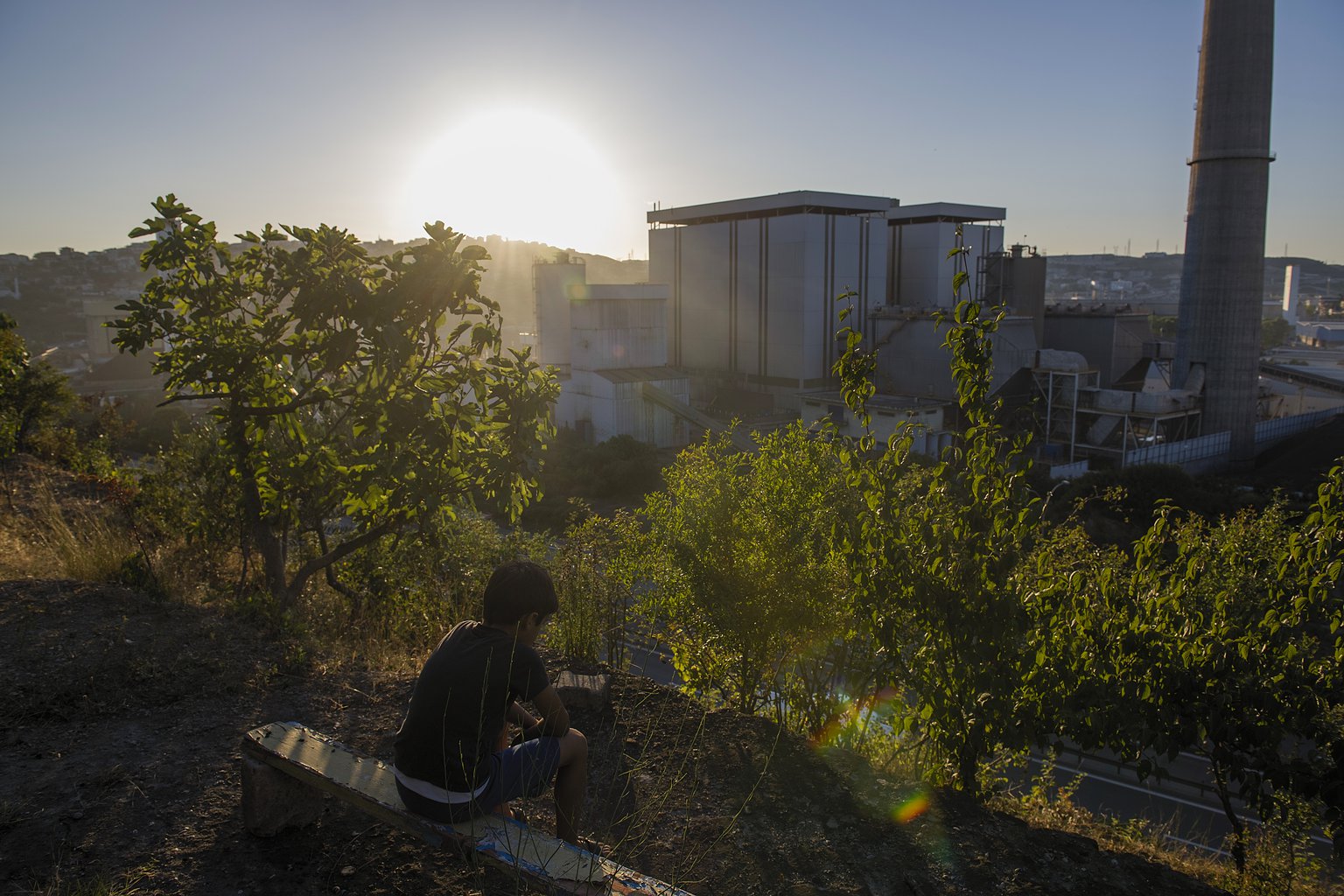
A young boy in Dilovası (Petruț Călinescu / The Black Sea)
The struggle for Kocaeli’s environment continues. The state’s disregard for court orders, suppression of science, and silencing of concerned citizens appears to have worked. There are no more scientific studies undertaken in the area, and demonstrations rarely, if ever, occur.
For all of the attention on the town and the wider region, many in Dilovası remain conservative, and struggle to balance a commitment to supporting the government with the practicalities required to end the problems.
Ismail Kaya, Ali Tahir and Ismail Sami, like many others suffering in the town, try to gain momentum and build a resistance movement. Ismail Kaya, the former municipal worker, has tried too many times, he said. “People never accepted going to court,” he told us. “They think God is trying them in this world with all these diseases. They think they’ll be rewarded with heaven if they take care of their sick kid on earth.”
He now rarely ventures outside of his house. “I’m done with this town,” he said.
Ismail Sami, on the other hand, does what he can to hold back the rising tide of cement factories and industrial plants. “I heard the process stopped and that Dilovası municipality will officially oppose the Akçansa plans,” Ismail Sami said. “But things are quiet now. Our action at the public meeting seems to have worked.”
He says they all still wait to hear officially if the effort was enough to dissuade Akçansa or the Kocaeli governor’s office, which can ignore the town's will and unilaterally sign off on the project. HeidelbergCement did not reply to questions.
A victory would be the first of its kind in Dilovası. If they succeed, Sami will not bask in glory, and said the next target is the massive coal site on the hill. He is already establishing a coalition of environmental organisations to begin campaigning to have it removed from the town.
“If our talks become action, we will succeed,” he said.
Additional reporting by Mina Eroğlu, Doğu Eroğlu, Ali Tahir Kaya, Elif Alçınkaya, Maria Kamarianaki
All images by Petruț Călinescu for The Black Sea, unless otherwise stated.
This story was supported by Journalismfund.eu
Images and text not subject to Creative Commons
*We corrected one word in this article on 2/10/2019. It was Dilovasi, not Kocaeli, that was recommended to be designated as a "health disaster zone" by the Turkish Parliament in 2007.
